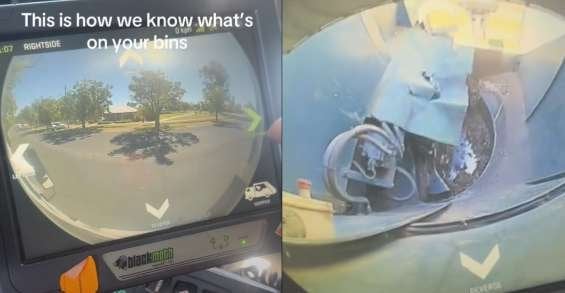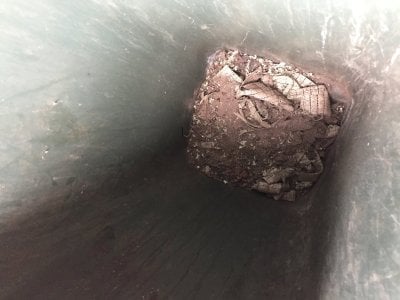Garbo collectors are onto you: This bin day mistake can cost you $1,674!
By
Danielle F.
- Replies 30
Australians take pride in their beautiful environment and understand the importance of proper waste disposal.
However, even the most well-intentioned Aussies could also make mistakes when it comes to sorting rubbish.
Gone are the days when you could chuck a rogue piece of rubbish into the wrong bin and think no one would be the wiser.
Seemingly innocent errors on bin day could become a costly mistake.
Rubbish collectors are now equipped with technology to catch sneaky acts of incorrect disposal.
In recent times, garbage trucks have been fitted with cameras.
These cameras could give collectors a clear view of what's being tossed into their vehicles.
What does this mean for homeowners during bin day?
If they notice soft plastics from your yellow bin or snuck non-compostable waste into your green bin, there's a high chance you will be spotted.
The use of this technology has prompted residents to think twice about their waste habits.
A recent video shared by a garbage collector showed how effective these cameras are.
Whenever a bin gets hoisted and its contents dumped into the hopper, the camera can capture everything.
What started as a load of cut grass soon revealed hidden plastic bags from the bottom of the bin—a no-no for the green bin.
'Here's our cameras,' the garbage man noted in the video.
'Everyone, this is how we know what's in your bins.'
Watch the collector's full video here:
Source: @conspiracytrucker/TikTok
A spokesperson from waste management company Veolia explained that these cameras allow drivers to 'see and record any items that should not be in the bin before it goes into the main compactor'.
'If the driver spots something that shouldn't be there, they press a button to take a photo of the item, the house it came from, and then share that information with the councils,' the spokesperson stated.
'The councils can then decide on what action they would like to take.'
'What happens next depends on the level of contamination. Small items that shouldn't be in the bin are removed at material recovery facilities,' the spokesperson added.
Small items may be removed at material recovery facilities.
However, if the contamination has the potential to affect the entire load, it could all end up in landfill.
Veolia's 700-truck has seen several bizarre items in bins, including a whole engine block in mixed recycling, a bag of money, and a donkey head.
However, the most concerning item for waste workers has been household batteries.
These small yet hazardous items could cause fires in trucks or facilities.
A recent study found that Australians are unsure about which bin to use 40 per cent of the time.
Meanwhile, 77 per cent are still confused about how to dispose of coffee cups.
Most councils have the authority to issue on-the-spot fines, suspend services, or remove bins for repeat offenders.
Penrith City Council in NSW has been penalising improper waste disposal since 2011.
The council's fines for contaminating yellow and green bins now reach up to $1,674.
To avoid these hefty fines, it's crucial to know your local council's waste disposal guidelines.
Let's make an extra effort to sort our waste correctly. Not only will it save you from fines, but it will also contribute to a cleaner community.

Have you ever been caught out on bin day? Do you have tips for ensuring everything ends up in the correct bin? Share your stories and waste disposal advice with us in the comments section below!
However, even the most well-intentioned Aussies could also make mistakes when it comes to sorting rubbish.
Gone are the days when you could chuck a rogue piece of rubbish into the wrong bin and think no one would be the wiser.
Seemingly innocent errors on bin day could become a costly mistake.
Rubbish collectors are now equipped with technology to catch sneaky acts of incorrect disposal.
In recent times, garbage trucks have been fitted with cameras.
These cameras could give collectors a clear view of what's being tossed into their vehicles.
What does this mean for homeowners during bin day?
If they notice soft plastics from your yellow bin or snuck non-compostable waste into your green bin, there's a high chance you will be spotted.
The use of this technology has prompted residents to think twice about their waste habits.
A recent video shared by a garbage collector showed how effective these cameras are.
Whenever a bin gets hoisted and its contents dumped into the hopper, the camera can capture everything.
What started as a load of cut grass soon revealed hidden plastic bags from the bottom of the bin—a no-no for the green bin.
'Here's our cameras,' the garbage man noted in the video.
'Everyone, this is how we know what's in your bins.'
Watch the collector's full video here:
Source: @conspiracytrucker/TikTok
A spokesperson from waste management company Veolia explained that these cameras allow drivers to 'see and record any items that should not be in the bin before it goes into the main compactor'.
'If the driver spots something that shouldn't be there, they press a button to take a photo of the item, the house it came from, and then share that information with the councils,' the spokesperson stated.
'The councils can then decide on what action they would like to take.'
'What happens next depends on the level of contamination. Small items that shouldn't be in the bin are removed at material recovery facilities,' the spokesperson added.
Small items may be removed at material recovery facilities.
However, if the contamination has the potential to affect the entire load, it could all end up in landfill.
Veolia's 700-truck has seen several bizarre items in bins, including a whole engine block in mixed recycling, a bag of money, and a donkey head.
However, the most concerning item for waste workers has been household batteries.
These small yet hazardous items could cause fires in trucks or facilities.
A recent study found that Australians are unsure about which bin to use 40 per cent of the time.
Meanwhile, 77 per cent are still confused about how to dispose of coffee cups.
Most councils have the authority to issue on-the-spot fines, suspend services, or remove bins for repeat offenders.
Penrith City Council in NSW has been penalising improper waste disposal since 2011.
The council's fines for contaminating yellow and green bins now reach up to $1,674.
To avoid these hefty fines, it's crucial to know your local council's waste disposal guidelines.
Let's make an extra effort to sort our waste correctly. Not only will it save you from fines, but it will also contribute to a cleaner community.
Key Takeaways
- Garbage trucks are using cameras to identify incorrect waste disposal inside bins as they are collected.
- Incorrect disposal of waste in bins can lead to substantial fines, with some councils in Australia issuing penalties of up to $1,674.
- The waste management company Veolia uses camera technology to help drivers spot and report contamination, potentially leading to entire truckloads being sent to landfills.
- Councils are intensifying efforts to reduce bin contamination, including issuing on-the-spot fines and suspension or removal of services for repeat offenders. Batteries are especially problematic, and people are encouraged to dispose of them properly.









